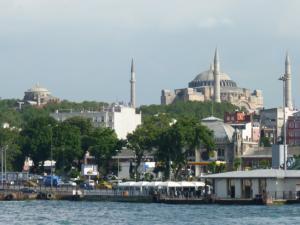 Peace is a good thing, but not the only good. One handicap to Middle East peace is that peace just now, with the present regimes, leaders, attitudes, would be a false and ugly peace. We all pray for peace, but we also pray for justice. It might be better to hope for a wary and watchful tension in the Middle East than a peace bought at the expense of the rights of minorities in the region.
Peace is a good thing, but not the only good. One handicap to Middle East peace is that peace just now, with the present regimes, leaders, attitudes, would be a false and ugly peace. We all pray for peace, but we also pray for justice. It might be better to hope for a wary and watchful tension in the Middle East than a peace bought at the expense of the rights of minorities in the region.
The Ottoman Empire demonstrated that it is “easy” to get centuries of peace in the Middle East. Turkish military power made the Middle East peaceful, even a sleepy backwater, but not a happy or prosperous area. Muslims, Christians, and Jews have existed in the region for centuries peacefully, but it was a peace bought by the sword and by the acceptance of Jewish and Christian minorities that they would be second-class citizens in their own homes.
The problem in the Middle East is not fundamentally the attitudes of the Christian or Jewish minorities. It is also not an exclusively “Islamic” problem since certain Islamic minority groups also face persecution and second-class citizenship.
Peace in the Middle East is difficult to achieve today, partly because past “peace” has been achieved the wrong ways. Colonial powers imposed peace, including Eastern and Western powers, but this taught the wrong lessons. Everyone can and sometimes should cry, “Give me liberty or give me death,” but a just society also has members who shout, “Give my opponent liberty or give me death.”
The difficulty is that many that are in the majority in the Middle East will not accept the rights of the minorities to live in peace. They do not do this because they are religious, often their religion is the only thing softening their bigotry, but because they are the majority in a particular nation and feel their power to impose their will. This is easy to see when one looks at the persecution of Islamic minority groups, following a different vision of Islam, by the Islamic majority in the culture of nations in the region.
The problem is not that the majority of people in these states are too “religious.” Israel herself is a secular state with a majority of the population not overly given to piety. Egypt and Syria are both secular regimes and have been so for decades.
Anyone who has visited the region knows that many people in the area are secularists, but that secularist power groups are no more peaceful than the religious. The “secular” regimes of Egypt and Syria demonstrated this truth in the past. These secular states were internally peaceful, but at the price of being unjust states. Property rights were ignored. Minorities faced persecution. These secular nations went to war with a secular Israel because they did not accept the existence of the Jewish state and felt they could impose their desires by force.
To be a Christian in most of these lands is to be ignored, forgotten, and persecuted. Appropriate our churches, our land, our liberty and nothing happens.
What are the major impediments to a just peace in the Middle East?
Part of the problem of the Middle East is anti-Semitism in the world and history. “Religion” is not the problem. An irrational hatred of Jewish people is not the sole domain of either religious or non-religious people. Secular and religious states have persecuted and killed Jews. Stereotypes about Jews exist in religious and non-religious groups. Secularism and religion are both infected with anti-Semitism. If there were no religion in the entire Middle East, this bigotry would still exist. Until such bigots are purged from the body politic there can be no peace in the Middle East.
Peace will also begin with recognizing the Palestinian people and their right to self-determination.
“Peace” in the Middle East is no great victory if it is won by trampling on the hopes of minority groups in every nation including Palestine.
A key problem is tolerance of thuggish regimes if they are found in former colonies or places with oil. Many of the governments in the Middle East are plutocracies that buy complacency from their subjects by fueling religious zeal they themselves lack with part of their loot. These secular rulers pay for anti-democratic forms of religion because it allows their regimes to continue. In some places, extremist religious groups have turned on the hypocrites who created them, but in most places that has not happened yet.
Islam is corrupted by pay-off money from oil sheiks not noted for their personal piety. The problem is not religion, but the corruption of religion and every other decent idea in the Middle East by wicked men intent on keeping up their looting and stealing. There can be no lasting peace in the Middle East when many of the nations there ignore the rights of a majority of citizens, let alone the rights of minorities.
Fanning hatred of Jews, as if Israel is the reason for the poverty in most of the region, is the same ugly strategy used in Russia to keep another tottering regime in power. But peace bought by pogroms only puts off the inevitable day of doom and makes the bill higher by combining injustice with more wickedness. The United States might find a temporary truce between Israel and her neighbors, but the rotting anti-democratic regimes in the region cannot be counted on to keep it.
Peace treaties signed with ugly thuggish regimes cannot be trusted past the lifetimes of the ugly thugs that rule them. Simultaneously, ignoring the aspirations of Palestinians, Syrians, and Christians in the Middle East to live in lands they have held for millennia is unjust and injustice cannot bring peace. The Middle East may face a few more decades of conflict before the rights of the Middle East minorities are secured. Until a Jew can dream of being President of Syria or a Christian can be head of government in Iran or Israel, there will be no just peace in the Middle East. Our goal should be to minimize conflict, but not overly quickly to impose “peace on the Middle East.”
Let us hope that slowly nations in the Middle East begin to protect the rights of the minorities. Perhaps, Jordan will begin to show the way Islamic societies can become democracies and respect the rights of minorities. Mayhap the rights of Palestinians in their homeland will be secured.
Perhaps.
All decent men and women hate war and long for peace, but all decent people also hate injustice and long for justice. We hope for the day when all people can live in harmony, but that day is not yet.
I pray for the peace of Jerusalem, but also the safety and rights of all the people who call that city home.
—————
An earlier version on this argument appeared in the Washington Post’s “On Faith.” Oddly they have deleted most of this content.












